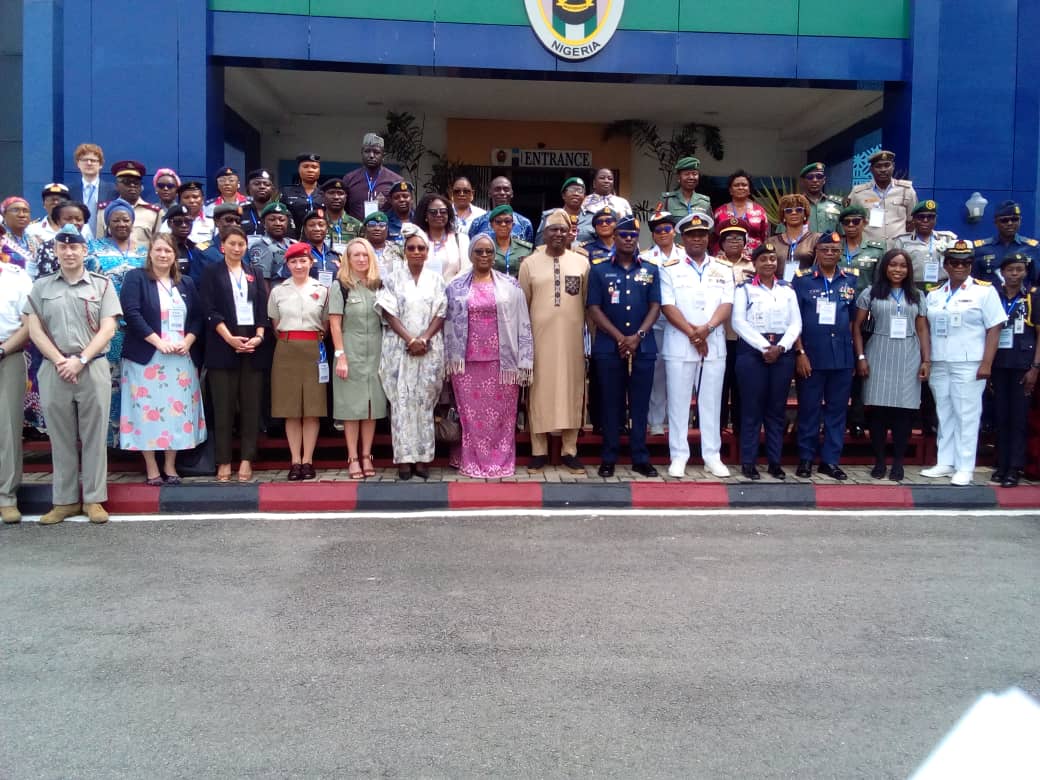By Sumaila Ogbaje
The Defence Headquarters (DHQ) has reaffirmed its commitment to advancing gender equality and inclusivity within Nigeria’s security sector, as part of efforts to strengthen civil–military cooperation and enhance operational effectiveness.
The pledge was made at the UK-supported Gender Symposium for Nigeria Security Actors, which opened on Tuesday in Abuja.
The symposium was organised to commemorate the 25th anniversary of the United Nations Security Council Resolution (UNSCR) 1325 on Women, Peace and Security.
In his welcome remarks, the Director of Civil–Military Relations, DHQ, AVM Olusola Akinboyewa, said the symposium offered a platform to deepen collaboration among security agencies, policymakers, and development partners on gender-responsive security practices.
Akinboyewa commended the Government of the United Kingdom, the Federal Ministry of Women Affairs, and UN Women for their continued partnership, noting that mainstreaming gender was a “strategic imperative” that enhances mission effectiveness and builds trust between security institutions and the public.
“At the Defence Headquarters, we remain deeply committed to strengthening the capacity of our personnel to understand and apply gender-sensitive approaches in line with global best practices and national security priorities.
“As we deliberate today, let us remember that mainstreaming gender is not merely a procedural or institutional requirement, it is a strategic imperative.
“A gender-responsive approach enhances mission effectiveness, strengthens trust between security institutions and the civilian population, and ultimately contributes to lasting peace, stability, and national development,” he said.
The British Deputy High Commissioner to Nigeria, Mrs Gill Lever, said the symposium formed part of the UK–Nigeria Security and Defence Partnership, describing gender inclusion as a key pillar of the collaboration.
She noted that the UK would continue to support Nigeria in reviewing and renewing the Armed Forces of Nigeria’s Gender Policy, while ensuring that gender perspectives inform national responses to emerging threats.
“Empowering women as leaders, peacebuilders and agents of resilience contributes directly to stronger, fairer, and more stable communities. Inclusive institutions are not only more effective but also more trusted,” she added.
The Minister of Women Affairs, Imaan Sulaiman-Ibrahim, said Nigeria had made significant progress since adopting its first National Action Plan on Women, Peace and Security in 2013, through capacity-building, gender training, and strengthened protection for women in conflict zones.
Suleiman , represented by the Assistant Director, Women Development, Mr Festus Bakpes, emphasised that achieving gender equality in peace and security requires relentless advocacy, innovation, and partnership.
She reaffirmed the government’s resolve to sustain momentum across all security institutions.
Also speaking, the UN Women Country Representative, Ms Beatrice Eyong, lauded Nigeria’s leadership in implementing UNSCR 1325, noting that the Armed Forces’ 37.9 per cent female participation in peacekeeping operations surpassed the UN benchmark.
“The coming years must be defined by collaboration and accountability to ensure Resolution 1325 is fully implemented across all contexts. When women lead, peace truly prevails,” Eyong said.
Also, the Director-General, Institute for Peace and Conflict Resolution (IPCR), Dr Joseph Ochogwu, represented by Mrs Susan Uwakwe, underscored the importance of inclusion as a foundation for lasting peace and security.
He said global experience had shown that societies which promote women’s participation in peacebuilding tend to be more stable and prosperous.
The symposium, jointly organised by the DHQ brought together senior officers, policymakers, gender advisors, and international partners to chart new pathways for integrating gender perspectives in Nigeria’s security architecture. (NAN)
